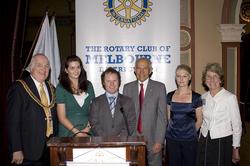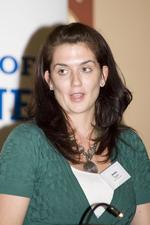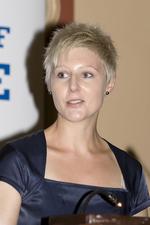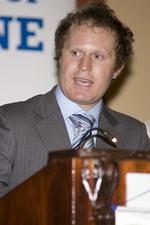|
Young Achiever Awards - 2007/2008
Each year, the Rotary Club of Melbourne recognises and honours outstanding young achievers with an award and a cheque for $1,000. Candidates need to show outstanding success in their formal education and have made a significant contribution in the form of service to the community.
There were three awards this year presented by Professor David de Kretser, Governor of Victoria, and Mrs Jan de Kretser.
Professor David deKretser, Governor of Victoria
I would like to begin by acknowledging the traditional owners and custodians of the land on which we stand the Kulin Nations, and pay my respects to their elders past and present. Jan and I are delighted to be here today to celebrate the outstanding achievements of the 2008 Young Achiever Award recipients. What wonderful people they are. They have all managed to pack a lot into their years and served our local and global community in such important ways.
Congratulations!
As the Governor, I am privileged to be exposed to an incredible range of community groups and organisations, often run by volunteer staff or funded by a significant component of philanthropy, all delivering services of the utmost value to our society. These young people are yet another shining example of volunteerism.
The immense contribution of volunteers to the community is made clearer when we consider it in an economic sense. More than 40 percent of Victorian adults, that is more than one million people, volunteer for more than one hour every week. Australia-wide, the contribution of volunteers to the nation’s economy translates into over $42 billion in donated time, energy and resources. Volunteering is a wonderful way to be involved in the community, as I’m sure all of you here today have discovered. No matter what your age, education level, nationality, religion, background, or profession, you can contribute. Volunteering plays an important role in strengthening and improving communities. Strong communities are active, confident, and resilient. They provide a network of support for those within the community, generating opportunities to participate, get help when needed and to have a say on issues that matter to the community.
We know there are significant challenges faced by Victorians on a daily basis. The increase in globalisation can sometimes serve to cause citizens to feel isolated and insignificant in a world that continues to change around them. That is why it is so important to establish and foster connections at a local level; to provide support and understanding at a community level where their benefit is strongest. Rotary embodies what it is to be a contributing member of society and a good global citizen.
There are many challenges that face local communities, our country, and our global environment.
As the world continues to change and we are presented with new challenges, it is ever more critical for us not to lose sight of the inner strengths and values that have enabled this nation to triumph over the greatest of adversities. It fills me with confidence that there are so many young people out there with a sense of community and social responsibility.
I would like to take this opportunity to encourage all of you to continue to make a difference, and to use the wisdom and skills that you have developed to make a valuable contribution to the world around you – whether it is in areas of community development, social equality, or environmental sustainability.
I commend all of the outstanding work of this year’s award recipients. But this is also a time to applaud those who have assisted these wonderful young people in achieving their goals – parents and families, teachers, mentors and of course Rotary. It is their dedicated time and support that has helped these fine young people to be here today.
I cannot close without issuing a challenge to Rotary. We face a major challenge as a country and a global society which is the matter of global warming, climate change and the need to develop a sustainable life-style. If we do not, we will leave a degraded planet for our children and grandchildren.
There is now a sense of urgency emerging that time is running short and I do not have time to give you the reasons why. Just one example is the greatest ever melt of the Arctic ice last summer, covering an area the equivalent of Texas and California combined. Ice reflects heat but water absorbs heat and does not reflect the heat back into the atmosphere. The ice melt by itself does not add to the water in the oceans but it does affect the speed of the melting of ice in Greenland that does contribute to the rising ocean levels.
I am heartened however that there are some fantastic initiatives underway in local communities that are committing to be carbon neutral by 2010. You are a fantastic organisation with local, state-wide and global networks that could pick up these initiatives, identify new ones and translate them into action.
Let me know if this a challenge to which Rotary as an organisation wishes to respond.
Finally, I would like to congratulate each award recipient once again and thank them for their important and continuing contributions to the community. hey are exceptional role models for other young Victorians and it will be people like them that will be the leaders of tomorrow.
Thank you.
Jessie Taylor
Following Honours Arts/Law at Monash, Jessie’s deep humanitarian values dictated her direction.
In 2007, studying in Dublin and France (she is fluent in French) on a full scholarship from the European Commission, she completed a Masters in International Humanitarian Assistance. Jessie also has a full PhD scholarship.
Much of her past employment reflects her strong interests – eg at the Springvale Monash Legal Service (working especially with Sudanese) and the Castan Centre for Human Rights Law where she researched and co-authored submissions and presentations to the Senate enquiry into the Migration Amendment (Designated Unauthorised Arrivals) Bill.
Over the past 5 years she has given countless briefings, lectures, seminars and workshops and had articles published on migration and refugee policy. She has worked with detainees at Baxter, Villawood and Maribyrnong. Her passion for the plight of refugees and asylum seekers is also reflected in a feature–length documentary she wrote and produced (called We will be Remembered for This).
Jessie has been a team leader for the Oaktree Foundation and a volunteer for the South East Centre against Sexual Assault. In 2006, as an intern for DFAT she was a delegate to the UN Commission on Human Rights. She is currently a Director of the Justice Project and an honorary research associate at the Monash Asia Institute.
Caroline Andrews
Caroline was Dux of her school and has received a number of scholarships and awards throughout her tertiary education at Melbourne University. Caroline achieved first class Honours in Science in 2005. She is currently undertaking a PhD, which focuses on climate change policy and the environmental movement.
Caroline’s passion is for community-based approaches to social and environmental issues. Her most significant community service is with the Lighthouse Foundation. She is on the Board of Directors, is chair of the Care Services Committee, and is a frequent speaker on their behalf.
Timothy Foster - Sir Albert Coates Award
Tim’s nominator (Rosemary Sheludko of Trinity College) described him as ‘probably the most outstanding young person I have ever had the good fortune to meet.’ Dux of Caulfield Grammar in 2000, Tim enrolled in Law/Engineering at Melbourne where he was showered with scholarships, awards and prizes for academic excellence in both faculties.
This included a Law Exchange Scholarship to study at the University of Amsterdam last year. As Senior Student at Trinity, he was very active in student leadership. A distinguished sportsman, representing Trinity and Melbourne University in football and cricket, he also has creative talents in photography, music and language. It is not surprising that Tim was a finalist for the Rhodes Scholarship.
To complement his very full student life he was involved in voluntary work for refugees, particularly the Sudanese, tutoring, coaching football and working at the Refugee Advocacy Centre.
But this was a mere sideline. In the past two years Tim has directed considerable energy into international development and environmental activities. He is a Director of Global Aid Partnerships, has taught at an indigenous NT primary school, researched techniques for reconstruction in Aceh, studied Humanitarian Law and learned about Safe Water. However his most significant activity began in 2005 as a volunteer teacher in Ghana.
|